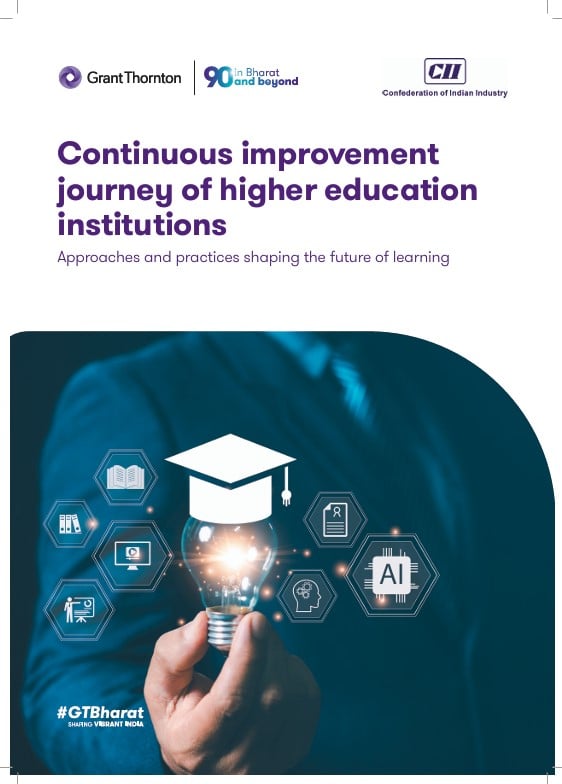For more updates follow Grant Thornton Bharat on WhatsApp

Empowering future-ready higher education institutions
Driving transformation through NEP 2020 and innovation
India’s higher education landscape is undergoing a significant transformation, driven by demographic momentum, policy reforms, and institutional expansion. From just 17 universities in 1947 to over 1,100 today, the system now serves 43.3 million students. The Gross Enrolment Ratio (GER) has risen from 21.6% in 2012–13 to 29.7% by 2024–25. Investments in K–12 education are bearing fruit, with more female and grade 12 completers entering higher education. Private institutions now account for 65.2% of enrollments, and college density has increased to 30 per lakh population, with 17 universities and 4,470 colleges exclusively for women—highlighting improved access and demand-led growth.
Building future ready institutions through NEP 2020 reforms
The National Education Policy (NEP) 2020 is a pivotal driver of reform, aiming to achieve a 50% GER by 2035. It promotes:
- Academic flexibility and modular learning
- Outcome-based education
- Internationalisation and vocationalisation
- Technology integration
- Transparent, autonomous governance
Implementation is underway through structured guidelines and institutional adoption.
Insights from the CII NR future-ready HEI roundtables
Emphasised the shift from traditional teaching to flexible, student-centric, and interdisciplinary models. Key challenges included rigid structures, limited faculty readiness, outdated assessments, and lack of collaboration. Technology and competency-based learning were seen as critical enablers.
Focused on embedding employability into education. Key drivers included evolving job markets and the shift from degrees to demonstrable skills. Challenges included fragmented skill frameworks, outdated assessments, and limited scalability of work-integrated learning.
Explored how institutions can adapt to rapid technological, economic, and societal changes. Emphasised the need for a balanced focus on students, faculty, industry, and community. A “one size fits all” approach was deemed ineffective, with continuous improvement and contextual strategies recommended.
Creating agile, inclusive, and sustainable learning ecosystems
Faculty development
Curriculum reform
Ethical AI integration
Collaboration across academia, industry, and government is essential. Five key behavioural shifts are critical:
- Academic delivery transformation: Flexible, personalised, and experiential learning
- Digital-first mindset: Tech integration across academics and administration
- Agility & adaptability: Systems that respond quickly to change
- Financial sustainability: Diversified revenue through research, alumni, and industry
- Human-centric design: Empathy, inclusion, and community impact in institutional design
What does a future-ready institution look like?
Agile and adaptable
To evolving learner, industry, and societal needs
Digitally integrated
Across academic and administrative functions
Governed transparently
Reflecting core values and diverse perspectives
Focused on personalised, interdisciplinary,
and lifelong learning
Globally relevant and locally responsive
Ensuring inclusive and impactful education
Case studies of higher education institutions
Indian School of Business (ISB)
Several HEIs are driving transformation aligned with NEP 2020. The Indian School of Business (ISB) exemplifies innovation through its ISB Online Design Framework, which reimagines digital learning for professionals. It focuses on cognitive engagement, reflection, and real-world application.
Key features include:
- Priming questions to spark curiosity and prepare learners.
- Modular, nugget-sized content for flexible, focused learning.
- Blended model combining self-paced modules with live faculty sessions.
- Multimodal assets like case studies, podcasts, and interactive explainers.
- Gamified simulations for decision-making practice.
- Continuous reflection and assessment to reinforce learning.
- Peer learning spaces for collaboration and shared insights.
- Behavioural nudges and analytics to sustain engagement and guide interventions.
Impact: Over 5,000 learners, 90%+ completion rate, and 4.5+ satisfaction scores across 20+ programmes. Learner analytics show improved retention and application through reflective and social learning.
Why it matters: ISB Online sets a benchmark for research-driven, reflective digital education. It transforms online learning into a cognitively rich, professionally relevant experience, demonstrating how design thinking, academic rigour, and technology can converge to deliver measurable impact.
Birla Institute of Technology and Science (BITS) Pilani
BITS Pilani, an Institution of Eminence, operates five campuses and offers NEP-aligned, flexible academic models including open electives, minors, dual degrees, and modular structures. Its Practice School (PS) programme provides real-world exposure through summer training (PS-I) and full-time industry immersion (PS-II), with stipends averaging INR 50,000–60,000. The Work Integrated Learning Programme (WILP) enables working professionals to learn online with digital labs and remote experimentation. Over 90% of graduates secure employment or pursue higher studies within six months.
Technology-enabled learning ecosystem
BITS Pilani integrates advanced LMS platforms, MOOCs, and remote labs to support hybrid learning. The upcoming Amaravati campus will be an AI-driven digital hub, reinforcing its commitment to scalable, tech-enabled education.
Agile governance and global collaboration
A three-tier academic approval system ensures responsiveness and rigour. Interdisciplinary courses and global partnerships (e.g., RMIT, University at Buffalo) support dual degrees and collaborative research. The Dubai campus enhances international reach.
Alumni-driven innovation and inclusion
Alumni fund scholarships, research, and entrepreneurship through platforms like CIIE, SPARKLE, and SOLVE. BITS ranks among India’s top institutions for producing unicorn founders. Its inclusive, merit-based admissions and SDG-aligned practices reflect a commitment to equitable, impactful education.
Panjab University
Panjab University (PU), one of India’s oldest public universities, has embraced NEP 2020 reforms with flexible academic pathways, credit mobility, and outcome-based education. Students earn credits in emerging domains like AI and entrepreneurship, with MOOCs contributing up to 20%. Experiential learning is embedded via internships and projects. PU’s inclusive, merit-based admissions and SDG-aligned practices reflect its commitment to equitable, future-ready education.
Key highlights:
- Flexible academic pathways with multiple entry-exit options and credit mobility.
- Emerging domain focus: AI, entrepreneurship, machine learning, and financial literacy.
- MOOCs integration: Up to 20% of credits via SWAYAM and NPTEL.
- Experiential learning: Internships, apprenticeships, and project-based modules.
- Digital-first approach: Hybrid learning, virtual labs, and digital skill development (e.g., Python, analytics).
- Research & innovation incentives: Patent grants, startup incubation, and faculty entrepreneurship.
- Alumni & faculty ventures supported by CIIPP and TEC.
- Financial sustainability: Industry-aligned short courses, certifications, and corporate training.
- Collaborative governance: Involvement of industry experts and alumni in curriculum and mentoring.
- Sustainability & social impact: Clean energy research, zero-waste initiatives, and community outreach.
- Green campus aligned with UN SDGs and global impact rankings.
Lovely Professional University
Lovely Professional University (LPU), located in Phagwara, Punjab, is one of India’s largest multi-disciplinary universities with 40,000+ students from 70+ countries. Known for its innovation-led, student-centric approach, LPU focuses on academic flexibility, entrepreneurship, sustainability, and global engagement.
Key highlights:
- Experiential evaluation at scale:
- ‘Learn and Earn’ model links academic credits to real-world, monetised projects.
- 5,000+ students participated; 2,000+ evaluated on project outcomes.
- Target: 50% programme coverage by 2026.
- Industry-integrated education:
- Internships, live projects, and co-developed modules with companies like IBM, Microsoft, and Infosys.
- Freelance earnings contribute to academic evaluation.
- Digital transformation:
- AI-powered dashboards, real-time tracking via UMS.
- GenAI tools used in coding/design; AI ethics sessions conducted.
- Entrepreneurship & skill development:
- Start-up cell supports incubation and funding.
- Freelance projects promote financial independence.
- Global & sustainable practices:
- Students from 70+ countries; active outreach in South Asia and Africa.
- Net-zero campus goal with 11 MW solar, composting, and e-mobility initiatives.
Manav Rachna International Institute of Research and Studies
Manav Rachna International Institute of Research and Studies (MRIIRS), a NAAC A++ and UGC Category I deemed university, serves 7,000+ students and 600 doctoral scholars. With 80% PhD-qualified faculty, it integrates NEP 2020 reforms through flexible, interdisciplinary curricula, MOOCs, and outcome-based evaluations.
Key highlights:
- NEP implementation: Modular courses, multiple entry-exit options, and up to 40% credits via MOOCs.
- Sustainability & IKS: Mandatory SDG literacy course and value-based education in Indian Knowledge Systems (IKS) and Universal Human Values (UHV).
- Digital learning: Blended learning, smart platforms, and nine fully online degree programmes.
- Social impact: Outreach in seven villages via the Dr O.P. Bhalla Foundation and partnerships with NGOs.
- Research & innovation: DT-RIC and MRIIF support student-led research and startups with seed funding.
- Governance: IQAC-led, data-driven, and SDG-aligned academic systems.
- Global engagement: Collaborations with Monash University and others for dual degrees and research.
MRIIRS exemplifies a future-ready, inclusive, and socially responsible institution aligned with national priorities and global standards.
India’s higher education is transforming through policy reforms, technology, and global skill demands. NEP 2020 drives learner-centric, multidisciplinary, digital models, fostering flexibility, employability, and lifelong learning. Future-ready institutions prioritise innovation, sustainability, and human-centric values to prepare graduates for a rapidly changing world.
Our insights
View all

Building India’s growth backbone: Warehousing wave and InvITs

GST Compendium: February 2026

